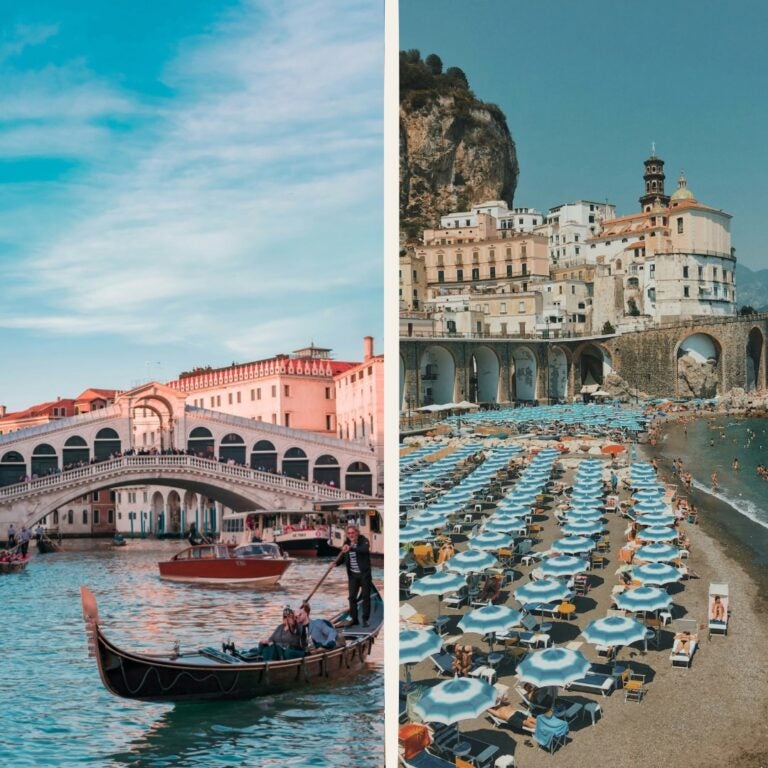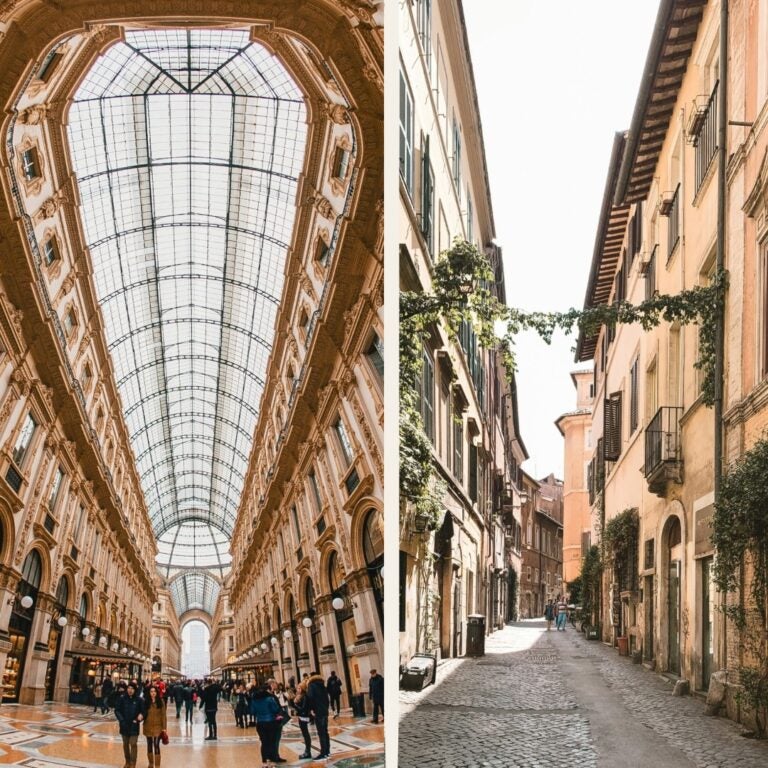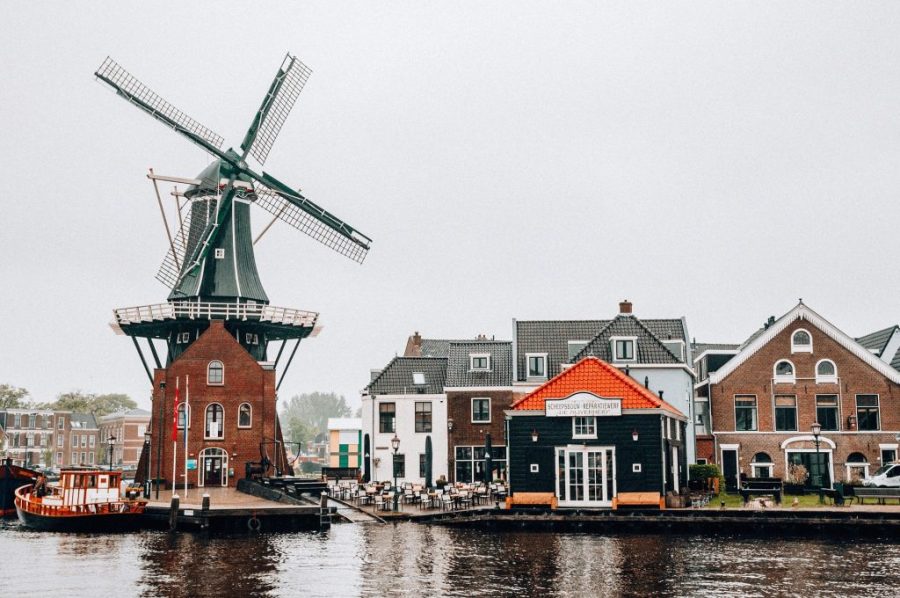Student visa for Italy: Requirements & process
In this post, you'll find all the information you need to apply for a student visa for Italy, including types, prices, and more.
If you’re dreaming of studying in a place steeped in history, culture, and world-class education, Italy is hard to beat. With its renowned universities and vibrant student life, it’s no wonder it’s a top destination for international students. In this guide, we’ll walk you through everything you need to know about getting a student visa for Italy and how to choose the option that best fits your study plans.
With its mix of affordable living, strong academics, and vibrant culture, Italy is a great place to study. From summer programs to undergraduate, master’s, or PhD studies, there are plenty of options. Here’s how to find the right visa for your plans and what you’ll need to apply.
When do you need a visa to study in Italy?
The need for a visa to study in Italy depends on your nationality and the length of your stay in the country. Below, we explain when a visa is required:
- Students from the European Union (EU), European Economic Area (EEA), and Switzerland: They don’t need a visa to study in Italy, no matter how long the course is. However, if they plan to stay longer than 90 days, they must register with the local authorities (Comune).
- Students from non-EU countries: If you’re coming from outside the EU and plan to study in Italy for more than 90 days, you’ll need a student visa. For short-term programs a tourist visa is usually enough.
Duration and type of studies requiring a student visa:
- University courses (bachelor’s degrees, master’s degrees, doctorates).
- Exchange programs such as Erasmus+ for non-EU citizens.
- Technical or professional training courses lasting more than three months.
- Long-term intensive Italian language courses.
Types of visas for studying in Italy
Italy offers two main types of visas for international students, depending on the length of their stay:
Type C visa (short-term visa) in Italy
This visa is designed for those who plan to study in Italy for up to 90 days. Suitable for:
- Short Italian language courses.
- Summer programs offered by Italian universities.
- Intensive workshops or seminars.
The C visa allows students to attend academic activities, but does not grant them additional permissions such as working while studying.
Type D visa (long-term visa) in Italy
This is the visa required for students who wish to stay in Italy for more than 90 days. It is the most common type of visa for those seeking:
- Bachelor’s, master’s, or doctoral degree programs.
- One-semester or full-year academic exchanges.
- Long-term professional or technical courses.
The Type D visa also comes with extra perks, like the ability to work up to 20 hours a week during the academic year and an easier process for getting a residence permit (permesso di soggiorno) once you arrive in Italy.
Benefits of visas for studying in Italy
Choosing a student visa for Italy comes with a range of benefits that enhance both your academic journey and personal growth:
- Access to prestigious universities: A student visa gives you access to internationally recognized universities, many of which offer English-taught programs in fields like design, engineering, arts, and the humanities.
- Job opportunities: The Type D visa allows international students to work part-time, helping cover expenses while gaining valuable work experience in an international setting. We also recommend using your HolaFly eSIM during your stay in Italy.
- Mobility within the European Union: Once in Italy, student visa holders can freely travel throughout the Schengen Area while their visa is valid. Perfect for exploring Europe during your free time.
- Permits for family members: In some cases, students may request that immediate family members, such as their partner or children, accompany them during their stay in Italy.
- Quality of life: Living in Italy means immersing yourself in amazing food and incredible culture. On top of that, many Italian cities are easier on the budget compared to other places in Europe.
Type C visa in Italy: What is it for?
The Type C visa in Italy, also called a short-stay visa, is meant for stays up to 90 days. It’s perfect if you’re planning to take short courses, workshops, or summer programs. This visa comes with several advantages, including:
- Access to specific academic courses: It allows international students to join language programs, specialized seminars, or summer courses at well-known institutions in Italy.
- Cultural exploration: While you’re there, you’ll have the chance to soak up Italy’s rich culture, explore its historic landmarks, and take part in cultural activities connected to your program.
- Mobility within the Schengen Area: With this visa, you can travel freely throughout Schengen countries, as long as you respect the 90-day limit.
Type D visa in Italy: What does it allow you to do in Italy?
If you’re planning to study in Italy for more than three months, the Type D visa is the way to go. For a smooth stay, we recommend getting a HolaFly subscription plan to stay connected at all times. This visa offers plenty of opportunities and benefits that enhance your academic experience:
- Advanced studies: It lets you enroll in bachelor’s, master’s, doctoral, or long-term technical programs at Italian institutions.
- Work permit: Allows you to work up to 20 hours per week during the academic period and full-time during holidays.
- Legal residence: Once in Italy, you can apply for a residence permit (permesso di soggiorno), which eases your integration into the country.
- Access to public services: With a residence permit, you can access the healthcare system, public transportation, and other essential services.
- Travel within the EU: As a holder of this visa, you can travel throughout the Schengen Area countries during the validity period of your permit.
Important: If you are a frequent traveler and want to stay connected without worrying about expensive roaming or looking for a new SIM at every destination, Holafly’s subscription plans are for you. With a single eSIM, enjoy internet in more than 170 countries for a fixed price and no surprises on your bill. Travel without limits and connect easily and securely! 🚀🌍

Requirements you must meet for each type of student visa in Italy
Before applying, you need to meet specific student visa requirements for Italy depending on the visa type. Here are the conditions for each.
Requirements to be eligible for a type C visa in Italy
- Enrollment in a short course: You must submit a letter of acceptance or confirmation of enrollment in a course that does not exceed 90 days.
- Proof of financial means: You’ll need to prove that you have enough funds to cover your stay in Italy, including housing and living expenses.
- Medical insurance: Travel insurance with a minimum coverage of $35,000 for medical emergencies and repatriation is required.
- Valid passport: Must be valid for at least three months after your planned departure date from Italy.
- Return ticket: You must provide a copy of your return ticket or proof of departure from the Schengen Area within the permitted time frame.

Requirements to apply for a type D visa in Italy
- Enrollment in a long-term program: You’ll need to submit an acceptance letter from an Italian university or educational institution specifying the program name, its duration, and the start date.
- Sufficient financial resources: You must show proof of funds covering at least $530 per month for living expenses, plus tuition and accommodation costs.
- International medical insurance: Must cover medical emergencies throughout your stay in Italy.
- Criminal record certificate: You may need to provide a document proving you have no criminal record in your home country.
- Language proficiency: Some universities require proof of proficiency in Italian or English, depending on the language of the academic program.
How to apply for a visa to study in Italy?
The visa application process for Italy may vary slightly depending on your country of origin, but in general it includes the following steps:
Documents you must submit to obtain a type C visa in Italy
- Application form: Complete the application form for a short-stay visa (available at the Italian consulate or online).
- Acceptance letter: Provide the official document issued by the institution where you will be taking the course.
- Passport: You must present your original passport and a copy. Make sure it has pages available for the visa.
- Recent photograph: Include a passport-size photograph that meets the required standards.
- Proof of funds: This can be a recent bank statement or a sponsorship letter showing that you have enough money for your stay.
- Travel insurance: Be sure to include a copy of your insurance policy with the minimum coverage required.
These documents must be submitted to the Italian embassy or consulate in your country of residence.
Documents you must submit to obtain a type D visa in Italy
- Long-term visa application form: Completed and signed.
- Acceptance letter from the university: Including details of the academic program, duration, and costs.
- Proof of enrollment: A copy of the tuition payment may be required.
- Proof of financial means: Bank statements, sponsorship letters, or scholarship documents that show you can pay for your stay.
- Health insurance certificate: It should cover the whole time you’re there.
- Proof of accommodation: Accommodation letter, rental agreement, or university residence confirmation.
- Criminal record and certified translation: This document must be properly legalized and translated into Italian if required.
You’ll need to submit your Type D visa application at the closest Italian embassy or consulate. In some cases, applicants may also be required to attend an interview during the process.
Interviews and questions when applying for a student visa in Italy
Getting a student visa for Italy may involve a personal interview at the Italian embassy or consulate. These interviews are designed to assess your intentions, verify your documents, and ensure you meet the visa requirements.
Among the topics that are usually addressed in these interviews are:
- Motivation for studying in Italy: You’ll be asked why you chose Italy, what academic program you plan to pursue, and how it fits into your career goals.
- Future plans: It’s common for them to ask about your plans after finishing your studies to make sure you don’t intend to stay in the country illegally.
- Financial resources: You may be asked how you plan to finance your stay in Italy, including details of your savings, scholarships, or sponsors.
- Connection with your country of origin: You’ll likely need to demonstrate strong ties to your home country such as family, employment, or assets to reassure them you plan to return after completing your studies.
- Language proficiency: Depending on the program, they may evaluate your proficiency in Italian or English.
Being well-prepared by bringing the right documents and answering honestly and clearly will boost your chances of success.
Where can I apply for a visa for Italy?
Applications for student visas for Italy can be made through the following channels:
- Italian embassy or consulate: This is where you’ll submit your application. Be sure to schedule your appointment ahead of time on the official consulate website for your country. Double-check that you meet all the requirements and have all the needed documents ready.
- Online platform: In some cases, Italian consulates let you start the process online by filling out the application form and uploading initial documents. However, you’ll likely need to attend in person for the final submission and interview.
- Visa application centers: Italy works with authorized external centers, like VFS Global, in several countries to help handle applications and collect biometric data. Check if this service is available in your area.
- Assistance from agencies or intermediaries: While it’s not mandatory, some people choose to hire professional consulting services to ensure their application is complete and minimize mistakes.
Make sure to check the specific instructions from the Italian consulate in your country, as procedures can vary.
How much does a visa to study in Italy cost?
The cost of a student visa for Italy varies depending on the type of visa and any extra services you need. Here are the main costs:
- Visa application fee: The base fee for a short-term student visa (Type C) is around $88. For long-term visas (Type D), the cost can be up to about $128.
- Medical insurance: Mandatory requirement and can cost between $60-230 depending on the coverage and length of stay.
- Translation and legalization of documents: If you need to translate and legalize documents into Italian, the cost typically ranges from $22 to $55 per document.
- Residence permit (permesso di soggiorno): Upon arrival, you must apply for this permit, which costs approximately $90.
- Visa center services: If you use a visa application center like VFS Global, additional service fees may apply, usually between $22 and $33.
We recommend preparing a budget that covers these expenses, as well as other related costs, such as trips to the consulate.

How long does it take to obtain a visa to study in Italy?
The time it takes to get a student visa for Italy varies depending on factors like the visa type, the time of year, and the consulate where you apply.
- Standard processing: Short-term visas (type C) are usually processed within 15 business days of the complete application being submitted.
- Long-term visas (type D): These visas can take between 30 and 60 days to process due to the more detailed evaluation of the documents.
- Variations depending on the time of year: During peak months like July and August, processing times may be longer. It’s best to start your application at least three months before your program begins.
- Residence permit: Once in Italy, the application for a permesso di soggiorno can take between 30 and 90 days to be approved.
Check with the Italian embassy or consulate in your country for up-to-date information on specific deadlines, as these may vary slightly.
Lawyers to advise you on the visa application process for studying in Italy
If you’re looking for expert help with your Italy student visa, there are immigration firms and lawyers who can assist you. Here are a few trusted options:
Fragomen
- Services: Advice on visa applications, documentation, and immigration compliance.
- Location: Offices in various cities around the world, including Milan and Rome.
- Contact: Available through their official website.
- Prices: Vary depending on the type of service, with initial consultations starting at $175.
Mazzeschi Legal Counsel
- Services: Specialized in study and work visas for Italy. They offer support in obtaining residence permits.
- Location: Offices in Florence, Rome, and Tokyo.
- Contact: Available online or by phone.
- Prices: Personalized consultations starting at $235.
Studio Legale Padovan
- Services: Assistance with immigration processes, document legalization, and certified translations.
- Location: Milan.
- Contact: Email and phone number available on their website.
- Prices: Services starting at $120.
Frequently asked questions about visas for studying in Italy
You should start the process at least three months before the start of your course.
Yes, you can renew it if you continue to meet the requirements, such as being enrolled in an academic program.
Yes, with a type D visa and a residence permit, you can work up to 20 hours per week.
Not directly, but you can change your immigration status after meeting certain requirements.
You can appeal the decision or reapply after fixing the issues mentioned in the rejection.
It depends on the program you enroll in. Some require a basic level of Italian or English.





 Language
Language 


















 No results found
No results found








